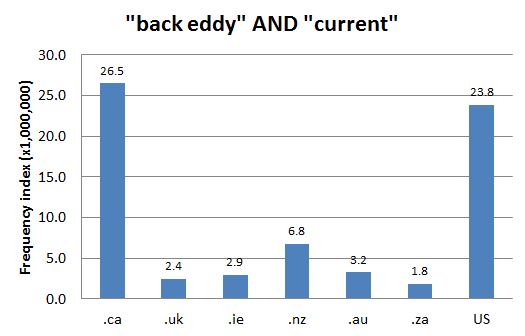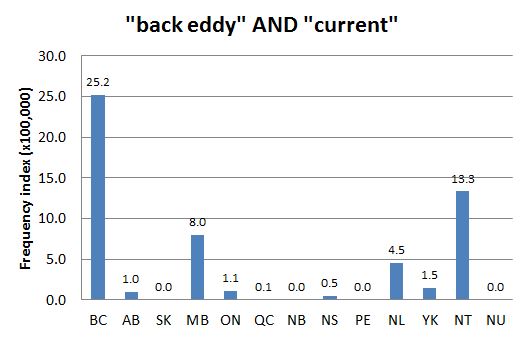DCHP-2
back eddy back-eddy DCHP-2 (September 2016)
1 n. — Geography, predominantly British Columbia
an area in a river or stream where the current has reversed due to an obstruction, creating a small pool or eddy.
Type: 5. Frequency — Back eddy is a preservation from British English, and particularly in an altered form from the BrE "eddy" of the same meaning (see OED-3, s.v. "eddy" (n.1)). Although back eddy does appear in British print news, it is most often, although not always, used figuratively (see meanings 2 and 3). It appears that eddy is the preferred term in the UK when referencing a pool created by an obstruction, whereas back eddy is used in Canada. Note that the term may be used in connection with liquids more generally in a metaphorical manner (see the 1919 quotation). Internet domain searches indicate that back eddy is most frequent in Canada and the US (see Chart 1). Chart 2 demonstrates the term's prevalence in BC.
See also COD-2, s.v. "back eddy" (1), which is marked "Cdn (esp. BC)".- A tendency for compounding can be seen in Canadian English lexis, as shown in DCHP-1's most recent period (1950-67), where more than 70% of Canadianisms are compounds (Dollinger & Brinton 2008: 48). The compound back eddy is only found occasionally in British print news, where the simplex term eddy is most common. In Canadian English, the situation is reversed, with the compound being the standard term.
2 n. — figurative use
a place that is thought to be far removed from centres of culture or activity.
Type: 3. Semantic Change — In Canada, the term underwent a metaphoric shift and may now refer to a location that is perceived to be rural and far from urban centres, similar to "backwater".
See also COD-2, s.v. "back eddy" (2), which is marked "Cdn (esp. BC)".3 n. — figurative use
an unimportant part of something that may be irrelevant; not the mainstream.
Type: 2. Preservation — This meaning appears to be a preservation from British English (see, e.g. the 1856 quotation from the London Times).4 v.
pertaining to liquids and similar substances, to move in a particular fashion creating back eddies (see meaning 1).
Type: 3. Semantic Change — A conversion from noun to verb that is not new (see the 1918 quotation), but more frequently used quite recently.References:
- COD-2
- Dollinger & Brinton (2008) Article Accessed 24 Nov. 2015
- OED-3
Images:
Chart 1: Internet Domain Search, 10 September 2013
Chart 2: Regional Domain Search, 17 Sep. 2013

